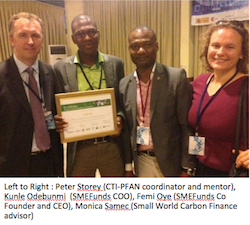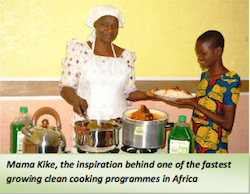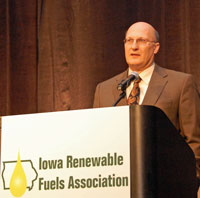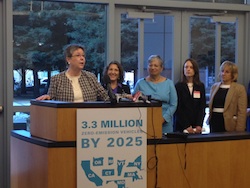 Natural Power has announced that consent has been granted for Fred. Olsen Renewables’ 20.7 MW Mid Hill II Wind Farm. The wind farm will comprise up to nine 2.3 MW Siemens turbines, and is sited next to the 25-turbine Mid Hill Wind Farm, which is currently under construction in Fetteresso Forest, near Stonehaven in Aberdeenshire, giving both developments a combined capacity of over 75 MW. When operational, Mid Hill and Mid Hill II could potentially generate enough electricity to power over 38,500 homes.
Natural Power has announced that consent has been granted for Fred. Olsen Renewables’ 20.7 MW Mid Hill II Wind Farm. The wind farm will comprise up to nine 2.3 MW Siemens turbines, and is sited next to the 25-turbine Mid Hill Wind Farm, which is currently under construction in Fetteresso Forest, near Stonehaven in Aberdeenshire, giving both developments a combined capacity of over 75 MW. When operational, Mid Hill and Mid Hill II could potentially generate enough electricity to power over 38,500 homes.- The school board of the Lucia Mar Unified School District (San Luis Obispo County, California) awarded Chevron Energy Solutions a contract to design and develop a program which will include solar energy systems, energy efficiency measures and improved lighting components that are estimated to save the district over $40 million, or about $20 million after paying all program costs over the 30-year project life. The project will include 1.7 MW of solar generation capacity at 7 district sites, upgraded HVAC systems, irrigation controls and energy-saving LED lighting. In total, the project is expected to reduce the district’s utility-purchased electricity costs by approximately 75 percent.
- ForceField Energy, an international manufacturer, seller and distributor of energy products and solutions, has announced the appointment of Stephane Vachon as its new Vice President of Business Development and Operations. Prior to joining ForceField Energy, Mr. Vachon was Chief Executive Officer and President of DEK International SA.
- First Power and Light, LLC has signed an Engineering, Procurement and Contraction contract valued at $7.5 million to install a 2 MW solar array on an existing landfill that will supply electricity to the community of Gilbertsville, Pennsylvania. This system to be installed will use approximately 8 thousand 250 kw solar panels. The project’s developers will use approximately 15 acres of land and the project is projected to break ground by the first of the year.
Energy Entrepreneurs Present Ideas in Africa
West African entrepreneurs and companies presented 10 clean energy projects totaling over USD $8 0 million to invest in Accra during the West Africa Forum for Clean Energy Financing (WAFCEF). The projects ranged from biofuels to solar, to biomass and hydropower. More than 100 financiers, clean energy experts and representatives of financial institutions from Africa and around the world took place in the event.
0 million to invest in Accra during the West Africa Forum for Clean Energy Financing (WAFCEF). The projects ranged from biofuels to solar, to biomass and hydropower. More than 100 financiers, clean energy experts and representatives of financial institutions from Africa and around the world took place in the event.
WAFCEF was the final stage of a business plan competition launched in March 2013 by the Climate Technology Initiative Private Financing Advisory Network (CTI-PFAN) and the Ecowas Center for Renewable Energy and Energy Efficiency (ECREEE), in partnership with the Sustainable Energy Fund for Africa (SEFA) and other regional partners.
According to Joao Duarte Cunha, Coordinator of SEFA, “This initiative united like-minded partners interested in harnessing the entrepreneurial talent of the region to promote economic progress by using West Africa’s vast clean energy resources. WAFCEF really connected all the dots – entrepreneurs, ideas, advisory support and financing – and provided a platform for the often neglected smaller clean energy projects to succeed.”
The contest entailed the presentations of 10 qualified project sponsors who presented their business plans to potential investors and made a pitch for financing. The goal was to identify the most promising business ideas and unlock renewable energy and energy efficiency investment in West Africa. The 10 projects had been selected from over 70 submissions from across the ECOWAS region for their economic viability and environmental benefits. Before being presented at the Forum, each of them had received intensive mentoring from professional consultants.
SME Funds‘ Bioethanol Scale-Up Project from Nigeria was picked as the winner of the WAFCEF 2013 business plan competition. The $28 million Investment in the first round will go towards scaling up their renewable ethanol cooking gel production and clean cookstove manufacturing. Already over 1 million liters of cooking gel has been produced locally using 2G Cellulosic Bio-Ethanol technology from wastes such as water hyacinth and sawdust from Lagos saw mills. SMEFunds has already recruited over 15,000  entrepreneurs through its Carbon Credit Network and helped them start green businesses that sell the cooking gel and stoves across Nigeria and West Africa.
entrepreneurs through its Carbon Credit Network and helped them start green businesses that sell the cooking gel and stoves across Nigeria and West Africa.
“People are hungry for good alternatives to kerosene and other unsafe, dirty cooking fuels,” said SMEFunds Co-founder and CEO Femi Oye. “We started with the simple belief that cooking shouldn’t kill. Why should our women cook with tears?”
SMEFunds plans to reach over 10 million households across West Africa with clean cooking and renewable energy technologies.
REG’s Haer: Biodiesel Helps Break Big Oil Monopoly
 As we recently recognized the 40th anniversary of the Arab Oil Embargo, which back then, showed how vulnerable the U.S. was working under foreign petroleum, one of the leaders at the nation’s biodiesel leader says his industry’s green fuel is a pathway to break the Big Oil monopoly. In this piece for the political blog, The Hill.com, Renewable Energy Group (REG) Vice president Gary Haer says biodiesel has grown from just a small, novelty fuel to a billion-gallon-a-year viable alternative to petroleum, foreign and domestic.
As we recently recognized the 40th anniversary of the Arab Oil Embargo, which back then, showed how vulnerable the U.S. was working under foreign petroleum, one of the leaders at the nation’s biodiesel leader says his industry’s green fuel is a pathway to break the Big Oil monopoly. In this piece for the political blog, The Hill.com, Renewable Energy Group (REG) Vice president Gary Haer says biodiesel has grown from just a small, novelty fuel to a billion-gallon-a-year viable alternative to petroleum, foreign and domestic.
Following the aggressive act by Arab members of the Organization of the Petroleum Exporting Countries (OPEC) to terminate exports to the West, Americans saw their gasoline prices soar fourfold setting off a decade-long recession. U.S. military involvement in Middle Eastern conflicts escalated consistently over the four decades that followed. These include the Iran Hostage Crisis, three full-scale wars in Iraq and Afghanistan, the current showdown with Syria over chemical weapons and nuclear weapons showdown with Iran.
Today the aforementioned national security experts and their supporters lead the U.S. Energy Security Council (USESC), an organization that is scathing in their conclusions of how the combination of current U.S. oil dependency and a lack of diversity in transportation fuels choices are affecting both our economy and our national security:Read More
Farmers Harvesting Biomass for Project LIBERTY
Farmers are now harvesting and delivering cob bales for the 2014 opening of Project LIBERTY in Emmetsburg, Iowa. Project LIBERTY is POET-DSM’s 20 million-gallon-per-year biorefinery currently under construction. When the facility begins production, it will use  corn crop residue – cobs, leaves, husk and some stalk – as the primary feedstock to produce cellulosic ethanol.
corn crop residue – cobs, leaves, husk and some stalk – as the primary feedstock to produce cellulosic ethanol.
With the 2013 harvest season already underway, growers have started delivering bales to the plant’s 22-acre stackyard. Although POET-DSM has organized four previous commercial-scale harvests in the past that have brought in nearly 200,00 tons of feedstock, this year’s bales will for the first time be used to produce cellulosic ethanol at the plant’s startup.
“Half of our biomass stackyard is filling up with cob bales for ethanol production,” Project LIBERTY General Manager Daron Wilson said. “Things are going smoothly. Our advance work over the last few years on feedstock logistics is paying off.”
Crop residue represents a new market for farmers that provides additional revenue with minimal input costs. It does not require any additional planting, and crop residue can be harvested with a standard baler. Nutrient replacement at POET-DSM’s suggested rate of removal – approximately 1 ton per acre or 25 percent of the above-ground biomass – is minimal.
“It’s been an easy way to diversify my farm operation and incorporate some much-needed crop residue management into the harvest,” said local farmer Charlie Kollasch. “This has been an important business opportunity for our area.”
POET-DSM intends to purchase approximately 100,000 tons from this year’s harvest to handle start-up and continuing operations through the 2014 harvest.
BioEnergy Bytes
 OwnEnergy has announced the sale of its Two Dot Wind Farm to NJR Clean Energy Ventures. Two Dot will be the 4th wind farm OwnEnergy has brought to shovel-ready status and sold. The Two Dot Wind Farm is located in Montana, 93 miles east of Helena, and is expected to create 40-60 temporary jobs during its construction phase and according to the National Renewable Energy Laboratory’s JEDI analysis, the project will have a total local economic impact of $8.2 million. Once completed, Two Dot will consist of six, GE 1.62 MW wind turbines, for a total capacity of 9.72 MW.
OwnEnergy has announced the sale of its Two Dot Wind Farm to NJR Clean Energy Ventures. Two Dot will be the 4th wind farm OwnEnergy has brought to shovel-ready status and sold. The Two Dot Wind Farm is located in Montana, 93 miles east of Helena, and is expected to create 40-60 temporary jobs during its construction phase and according to the National Renewable Energy Laboratory’s JEDI analysis, the project will have a total local economic impact of $8.2 million. Once completed, Two Dot will consist of six, GE 1.62 MW wind turbines, for a total capacity of 9.72 MW.- Heraeus Photovoltaics has announced that effective November 1, 2013, Andreas Liebheit will join the company as a new executive member. Liebheit will be transitioning into the Global Management role of the Heraeus Photovoltaics Business Unit, replacing Andy London, the current Global Manager, upon his retirement in January 2014. Liebheit has held leadership positions in the solar industry since 2006.
- The City of Patterson, California and Chevron Energy Solutions will soon ‘flip the switch’ on a solar and energy efficiency project that is expected to save the community $6.5 million and reduce its utility electricity purchases by 90 percent. In what may be the first of its kind and scope in Stanislaus County, the project includes solar installations and energy efficiency programs designed to reduce energy usage. The city will generate its own green, renewable electricity, dramatically reducing citywide energy costs, saving taxpayers over the life of the project, and making neighborhoods safer by replacing streetlights with more efficient LED fixtures.
- CHS Inc. has announced today the release of its new grain trading mobile app. The free app allows easy access to CHS grain terminals, soybean processing plants and select service center bids. It enables producers to make, monitor and manage offers to sell corn, soybeans and wheat electronically. The app also provides market information with the ability to create and manage futures-only, basis-only and cash offers.
Hitachi Zosen Membrane Increases Ethanol Efficiency
Greenbelt Resources Corporation, under its subsidiary Diversified Ethanol Corporation, has announced the selection of Hitachi Zosen Corporation as a collaborator on its ethanol dehydration module. Greenbelt has successfully integrated the zeolite ceramic membrane innovation from Hitachi Zosen to achieve a higher purity ethanol through a more efficient extraction of residual moisture. After a global search, Greenbelt said it chose the ceramic membrane from Hitachi Zosen for its durability, easy-to-maintain seal-less structure and high reliability.
 “As we accelerate our efforts to establish overseas partners and expand the use of our technology, the addition of our zeolite ceramic membrane to the Greenbelt solution is a first for our company in the growing U.S. ethanol marketplace,” said Dr. Masanobu Aizawa, General Manager of Research and Development Strategy Department at Hitachi Zosen. “Greenbelt has the most extensive knowledge of using membrane technology in the ethanol dehydration process in the U.S. and our collaboration is ideal for us to leverage our innovations and add value that is useful to our global society.”
“As we accelerate our efforts to establish overseas partners and expand the use of our technology, the addition of our zeolite ceramic membrane to the Greenbelt solution is a first for our company in the growing U.S. ethanol marketplace,” said Dr. Masanobu Aizawa, General Manager of Research and Development Strategy Department at Hitachi Zosen. “Greenbelt has the most extensive knowledge of using membrane technology in the ethanol dehydration process in the U.S. and our collaboration is ideal for us to leverage our innovations and add value that is useful to our global society.”
Hitachi Zosen will be providing the Greenbelt design team with a deep understanding of the membrane structure and their process design criteria. Through their partnership, Hitachi Zosen aided Greenbelt in the invention of a module to house the membranes, as well as helped them develop an overall system design that both achieves target ethanol standards and is simple and highly efficient. The simplicity and efficiency of the Greenbelt dehydration module enables membrane technology to become a contending alternative to molecular sieves traditionally used to dehydrate ethanol.
“In addition to the level of excellence in the simple yet durable design of their membrane technology, we are extremely impressed with the customer service from Hitachi Zosen,” said Darren Eng, CEO of Greenbelt Resources Corporation. “This is a winning combination of global expertise and the entrepreneurial approach by a U.S. upstart to deliver a truly economically sound and energy-efficient solution to the production of viable commercial ethanol for local market communities around the world.”
Hitachi Zosen has operated a zeolite membrane like the one used by Greenbelt in continuous commercial service since March, 2009. In addition to technical support, Hitachi Zosen conducted hands on training for membrane installations and participated with Greenbelt in system stress and performance testing.
Fossil Fuels Still Dominate Energy Consumption
According to new Vital Signs Online trend report released by Worldwatch Institute, coal, natural gas, and oil accounted for 87 percent of global primary energy consumption in 2012. This occurred as the growth of worldwide energy use continued to slow due to the economic downturn. The analysis shows the relative weight of these energy sources keeps shifting, although only slightly. Natural gas increased its share of energy consumption from 23.8 to 23.9 percent during 2012, coal rose from 29.7 to 29.9 percent, and oil fell from 33.4 to 33.1 percent. The International Energy Agency predicts that by 2017, coal will replace oil as the dominant primary energy source worldwide.
The report notes that the shale revolution in the U.S. is reshaping global oil and gas markets. The United States produced oil at record levels in 2012 and is expected to overtake Russia as the world’s largest producer of oil and natural gas combined in 2013.  Consequently, the United States is importing decreasing amounts of these two fossil fuels, while using rising levels of domestic natural gas for power generation. This has led to price discrepancies between the U.S. and European natural gas markets that in turn have prompted Europeans to increase their use of coal power. Coal consumption, however, was dominated by China, which in 2012 for the first time accounted for more than half of the world’s coal use.
Consequently, the United States is importing decreasing amounts of these two fossil fuels, while using rising levels of domestic natural gas for power generation. This has led to price discrepancies between the U.S. and European natural gas markets that in turn have prompted Europeans to increase their use of coal power. Coal consumption, however, was dominated by China, which in 2012 for the first time accounted for more than half of the world’s coal use.
Global natural gas production grew by 1.9 percent in 2012, dominated by the United States (with 20.4 percent of the total) and Russia (17.6 percent). Other countries accounted for less than 5 percent each of global output.
In 2012, coal remained the fastest-growing fossil fuel globally, although at 2.5 percent the increase in consumption was weak relative to the 4.4 percent average of the last decade. China increased its coal use by 6.1 percent, and India by a significant 9.9 percent in 2012. Coal use by members of the Organisation for Economic Co-operation and Development (OECD) declined by 4.2 percent, as an 11.9 percent decline in U.S. consumption outweighed increases of 3.4 percent in the EU and 5.4 percent in Japan.
Oil remains the most widely consumed fuel worldwide, but at a growth rate of 0.9 percent it is being outpaced by gas and coal for the third consecutive year. The OECD’s share declined to 50.2 percent of global consumption-the smallest share on record and the sixth decrease in seven years. This reflects declines of 2.3 percent in U.S. consumption and 4.6 percent in EU consumption. By contrast, usage in China and Japan rose by 5.0 and 6.3 percent, respectively.Read More
RIP E10 Blend Wall
On the heels of surging E15 and E85 sales, the Iowa Renewable Fuels Association (IRFA) has declared the so-called E10 blend wall dead. Recent calls to modify the federal Renewable Fuel Standard (RFS), say IRFA, have centered on the myth that it is impossible to sell blends above 10 percent ethanol (E10), but actual retailer sales data proves otherwise.
“All too often the debate in DC is disconnected from the real world – and the debate surrounding the bogus E10 blend wall is no different,” explained IRFA Executive Director Monte Shaw. “There is no E10 blend wall.”
 “Everywhere higher blends have been offered, consumers have responded positively. Rather, there are frivolous ethanol access restrictions (FEAR) – FEAR that is being systematically heightened by Big Oil through lies, lawsuits, and legislative attacks in an attempt to preserve its fuel monopoly,” continued Shaw. “In truth, the RFS is the only tool we have to combat Big Oil’s FEAR mongering and provide consumers the opportunity to choose lower cost, cleaner burning ethanol blends like E15 and E85.”
“Everywhere higher blends have been offered, consumers have responded positively. Rather, there are frivolous ethanol access restrictions (FEAR) – FEAR that is being systematically heightened by Big Oil through lies, lawsuits, and legislative attacks in an attempt to preserve its fuel monopoly,” continued Shaw. “In truth, the RFS is the only tool we have to combat Big Oil’s FEAR mongering and provide consumers the opportunity to choose lower cost, cleaner burning ethanol blends like E15 and E85.”
IRFA released the first month of sales data for E15 in Iowa following its September 16 reintroduction. The six registered E15 retailers in Iowa reporting data sold 23,959 gallons of registered E15 in only one month – enough to make more than 19 trips around the world!* Each of the retailers also offers other higher blends for flexible fuel vehicles, including E85. Averaged across all fuel blends, ethanol accounted for roughly 25 percent of the retailers’ gasoline sales. This level of ethanol sales far exceeds the scheduled RFS levels for years to come.
Shaw added, “We have real world data on higher blend ethanol sales and the facts are clear. In Iowa, and to my knowledge around the country, every retailer that offers higher ethanol blends like E15 and E85 exceeds the percentage of conventional renewables called for by the Renewable Fuel Standard – in 2014 and far beyond. This proves consumers will buy enough higher ethanol blends to exceed the RFS if given a chance. If policymakers compare Big Oil’s hypothetical blend wall horror stories to real world data they quickly learn it’s not that you can’t sell these ethanol blends; it’s that Big Oil refuses to do so. ”
With attractive pricing, second quarter E85 sales in Iowa nearly doubled those in the first quarter. While official third quarter sales data has not been released by the state, a sampling of retailers indicates third quarter sales will continue the upward trajectory and could be 50 percent higher than second quarter data.
*Assumes a vehicle achieving 20 miles per gallon. Only six of Iowa’s eight registered E15 retailers shared sales data with IRFA.
New Agreement to Bring EV’s to the Road
There is a new multi-state cooperative agreement to put more than three million battery-electric vehicles (EV), plug-in hybrid-electric vehicles, and hydrogen fuel-cell-electric vehicles on U.S. roads. The Consumer Federation of America (CFA), joined representatives  from California, Connecticut, Maryland, Massachusetts, New York, Oregon, Rhode Island and Vermont to announce an agreement to promote the accelerated adoption of zero emissions passenger cars, trucks and transit buses in these states.
from California, Connecticut, Maryland, Massachusetts, New York, Oregon, Rhode Island and Vermont to announce an agreement to promote the accelerated adoption of zero emissions passenger cars, trucks and transit buses in these states.
“Efforts to provide consumers with new, more efficient and gasoline-free transportation options are welcome and needed,” said Mark Cooper, Director of Research for CFA, who took part in the public announcement of the new agreement.
The Zero Emissions Vehicle Program: Clean Cars States Lead in Innovation, a new paper released today by CFA, explains that Zero Emissions Vehicle policy coupled with efforts to reduce barriers to clean vehicle adoption will accelerate the growth of the national market for the latest zero emissions vehicles. Based on years of polling data, the paper explains, that is exactly what American consumers want.
“The key role that California and the Clean Cars states played in accelerating the deployment of hybrids in the past decade underscores the importance of leadership in energy innovation,” said Cooper.Read More
InfraCal 2 Analyzer Offers Better Biodiesel Features
 A new analyzer will give biodiesel producers more and better features for the industry. This piece from Biodiesel Magazine talks about the new InfraCal 2 Analyzer, recently introduced by Wilks, that provides better repeatability, multiple calibrations, unlimited data storage, optional internal battery pack, touch screen display and password protection for instrument settings for biodiesel in diesel measurements.
A new analyzer will give biodiesel producers more and better features for the industry. This piece from Biodiesel Magazine talks about the new InfraCal 2 Analyzer, recently introduced by Wilks, that provides better repeatability, multiple calibrations, unlimited data storage, optional internal battery pack, touch screen display and password protection for instrument settings for biodiesel in diesel measurements.
The InfraCal 2 incorporates new electronics providing a better signal-to-noise ratio that improves the stability and repeatability. The calibration scheme makes it easier to get an accurate zero, which contributes to more repeatable readings. The analyzer’s multiple calibration capability enables users to have calibrations for numerous types of diesel fuel, making measurements even more accurate on different feedstocks.
The InfraCal 2 Analyzer provides a virtually unlimited amount of internal data storage. For users testing fuels at different locations or at a remote loading rack, data can periodically be transferred serially or via a flash drive. The internal battery pack will last up to 12 hours bringing portability to a new level and eliminating the need to ship samples to a laboratory and wait for results.
User will also find the touch screen on the InfraCal 2 allows them to password-protect calibrations and instrument settings, and they will be able to tag each measurement with information about the analyst, location, date and time of the measurement.

